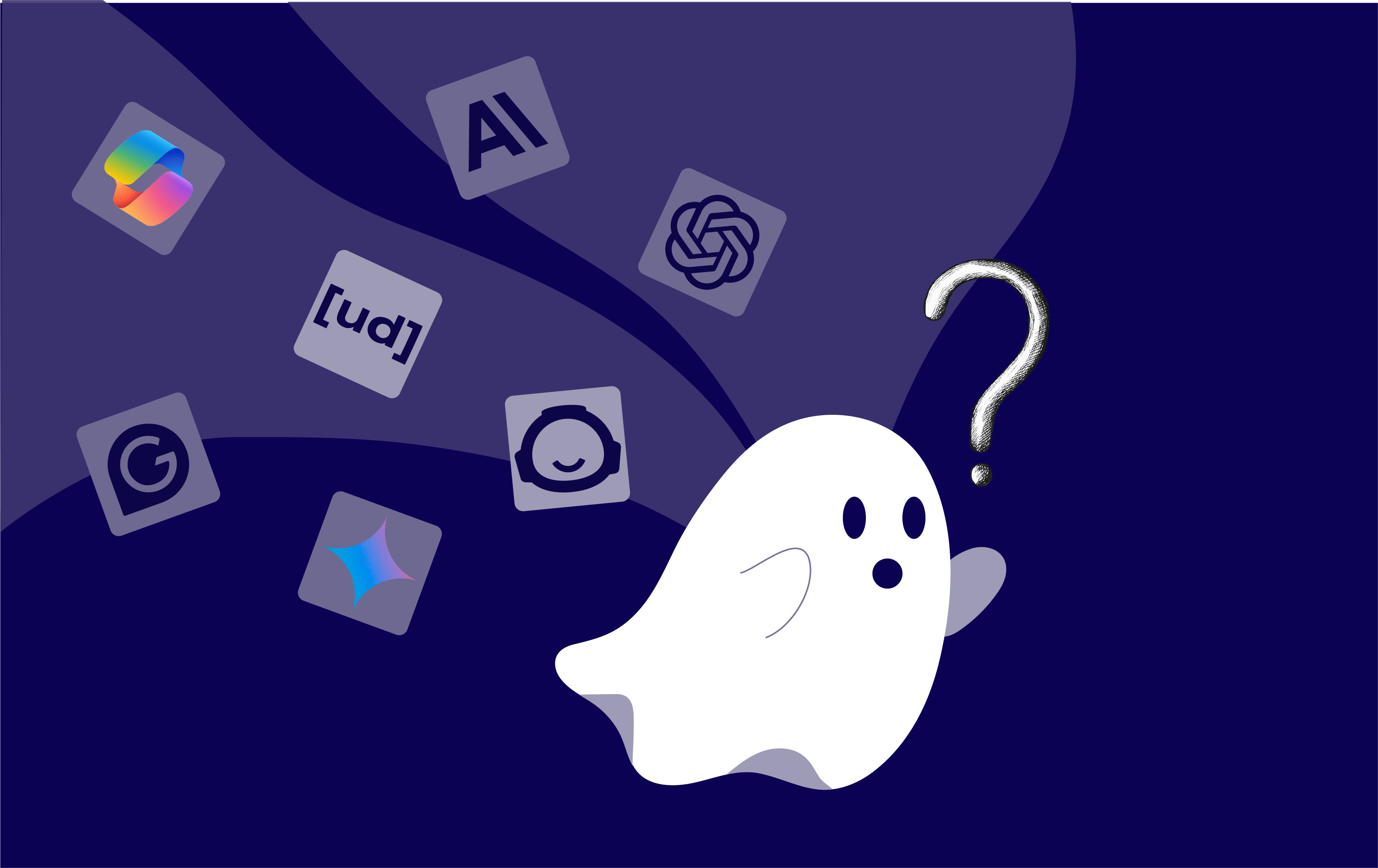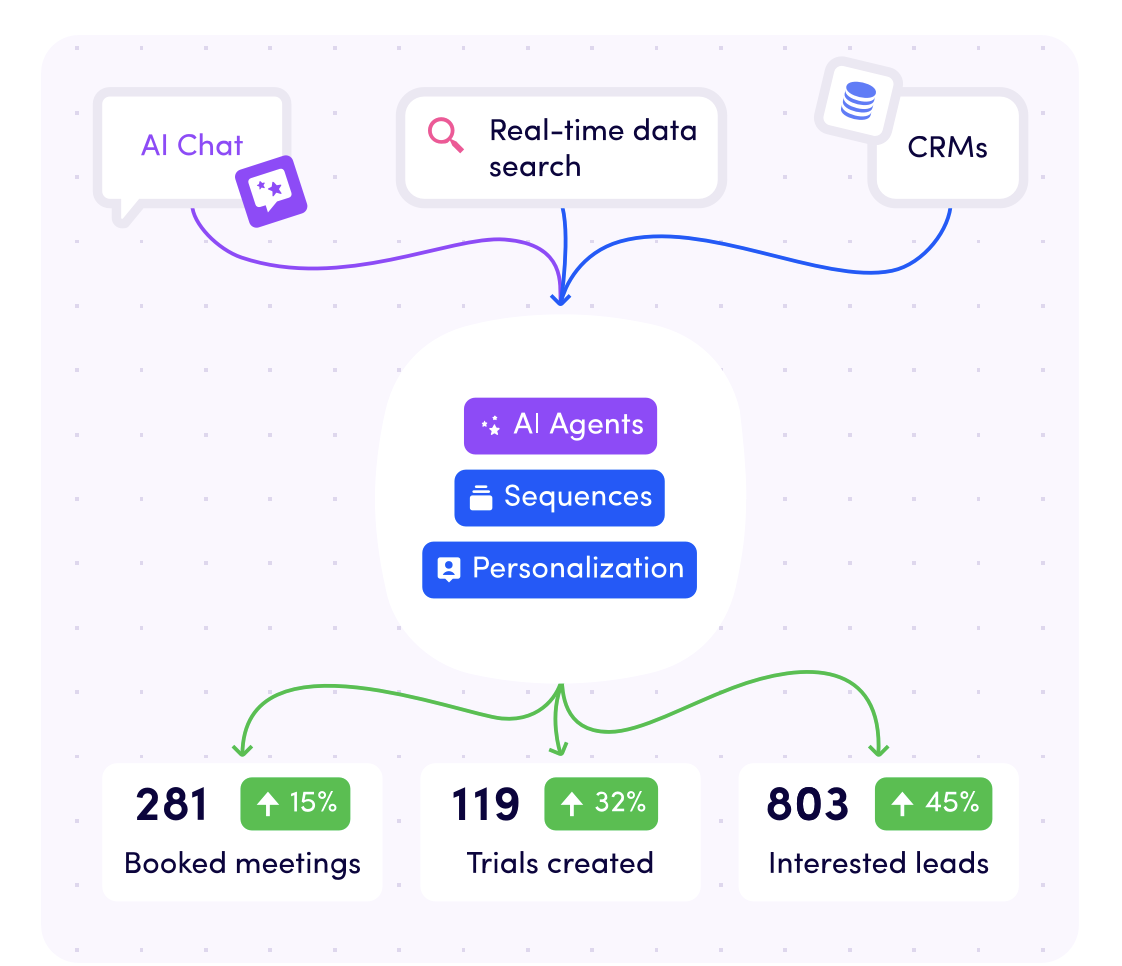How To Use AI Marketing To 10x Your Performance In 2024!

Updated on 11/06/2024
Artificial Intelligence (AI) is infiltrating businesses at a fundamental level to promote growth, cut time-consuming tasks down and automate processes to boost productivity and revenue.
For the businesses and digital marketers of today, we know that success is largely dependent on how well you can reach and engage with your audience.
💡 Are you looking for the best Generative AI tools for your marketing efforts? You can find them here!
Understanding the nuances of their behaviours and motivations, and offering targeted solutions to their biggest challenges is your main goal as a digital marketer.
AI lends an assist here, with sophisticated learning that turns customer data into actionable insights for digital marketers to derive campaign strategies.
So we know AI is here to stay simply because it has so many practical uses and benefits.
You probably have some hands-on experience with AI marketing tools like ChatGPT, Midjourney, Jasper, or any other AI-powered tool already.
And you've probably also heard the buzz around "AI Marketing"
What is it exactly and how can we use it?
Read on to understand the power behind Generative AI and AI-driven insights.
Use this table if you want to jump to a specific section.
What is AI Marketing?
AI marketing is the method of leveraging artificial intelligence technologies to automate data collection and analysis. This will help you understand the behavioural patterns of customers and automate marketing processes.
All of these increase the effectiveness of your marketing efforts.
In short, AI uses sophisticated tech to achieve business goals. AI is designed to act on behalf of a human.
Where normally, a decision would be made by an actual person, AI jumps in and makes an informed decision based on compiled raw data.
1️⃣ Artificial Intelligence will gather data with several key indicators, like demographics, shopping habits, or the specific products a customer has searched for and so on.
2️⃣ AI then takes this information and uses it for analysis and targets the customer with an advert, an email or another form of marketing.
The major difference in all of this is speed.
What might take us as humans a few minutes or hours can be reduced to seconds with AI.
It doesn’t need to wait for authorisation from personnel, it can make split-second decisions with customised messaging to target customers and boost customer engagement.
When you consider these types of capabilities it’s easy to see why more businesses are open to the adoption of AI in their operations.
Some common uses for AI in marketing efforts are:
- Data analysis
- Natural language processing
- Content generation
- Real-time personalisation
- Media Buying
- Marketing Automation
Core components of AI
Meeting the expectations and demands of customers is becoming more complicated. The last few years have revealed a shift in the power struggle between brand and buyer.
Customers are voting with their wallets and their attention, choosing to invest time and money in the businesses they feel personally connected to on an emotional level, it’s not just about how financially viable a purchase is anymore.
AI helps businesses uncover these behavioural indicators and better informs marketing solutions.
There are three core aspects to AI:
1. Machine Learning
Much like how a human learns from experience, machine learning uses sophisticated tech and algorithms to correlate historical data with new information and make decisions based on what is most likely to succeed.
As the computer analyses more customer data and learns, it can automatically increase its artificial intelligence offering more accurate and tailored solutions. Will Smith would be terrified.
2. Big Data and Analytics
The sheer amount of data circulating on the planet is almost unquantifiable.
As a marketer, you’re tasked with making sense of these large data sets to extract useful indicators that will lead to better customer experiences and more acquisitions.
AI takes the legwork out of this laborious process to organise and analyse the customer journey.
Marketers take these insights to produce more accurate campaigns that increase customer engagement and conversion.

3. AI Platform Solutions
AI-powered solutions provide a central platform for companies to consolidate and manage data, streamline processes and automate tasks.
AI platforms utilise marketing intelligence to make data-driven decisions about how best to reach your customers.
How you can use AI in marketing

AI is being used across multiple industries including healthcare, retail, government, finance and entertainment but let’s look specifically at how AI is being used in marketing:
Automating Ad Buys
Referred to as programmatic media buying, AI can be used to bid on available online ad space using algorithms and data insights to determine the best possible ROI (return on investment).
This allows companies to be agile by bidding in real-time using AI to keep up with an evolving marketplace.
It also provides flexibility as it can change aspects such as content in real-time to suit customer preferences, something that would take a person much longer to analyse and adapt.

Personalising Customer Experiences
AI allows businesses to personalise customer experiences which can lead to more leads and conversions. If you take the example of an online clothing store.
You might spend 20 minutes perusing the site, clicking in and out of different products, checking if they have your size or choice of colour etc.
If you do buy, great news for the retailer they made a sale but if you don’t purchase there and then, AI-powered businesses needn’t lose their heads.
The AI has been tracking how and what you've been interacting with the whole time and when you come back to the site at a later date, it will suggest items it thinks are suitable based on your shopping experience.
Or, you might get an email with a collection of items tailored to your taste and style. All of this works to increase the conversion rates and improve data for future marketing strategies.

Chatbots
Another time-saving and customer-centric application for AI’s natural language processing is chatbots.
Customer service is set to reach a completely new height with this AI-driven automation.
These clever digital agents respond to customer queries using historical data that answers the most commonly asked questions, saving customer service agents time but also allowing them more time to answer complex queries.

Sales Forecasting
Predictive analytics combines machine learning, algorithms, models and datasets to determine what products or services are most likely to win customers over based on historical data.
This marketing intelligence is great for marketers when they need to understand their target audience and buying behaviours in creating effective campaigns.

(image source: b2bresolute)
Generative AI
Studies have shown that AI can improve digital marketer's productivity by 66% if these AI-marketing tools are used effectively.
Generative AI can be used effectively in marketing teams to help you craft email content, blog articles, images, and even a full-on digital marketing strategy.
Using it to automate email messages, write a blog post, brainstorm social media posts, design images and other repetitive tasks.
Ultimately it frees up time for creators to do what they do best, create.
Although AI is becoming increasingly advanced, it’s unlikely to replace the human element of creativity and originality generated by creators, so don’t panic just yet writers and designers!
AI will help you in the process of creating valuable marketing content, but it will not do it for you.
Think of it as more of a curation marketing tool to save time exploring ideas or scouring the web for popular topics, keywords, and images.
Be careful to not copy-paste AI-generated content from for example ChatGPT.
AI-generated content is often not in line with your brand guidelines and your audience will most certainly see that the content is not original.
Again, use AI to brainstorm marketing campaigns and ideas, don't let it create everything for you.

Dynamic Pricing
AI can be used to make real-time adjustments to pricing based on the demand or supply of a product.
Predictive analytics tell us how popular a product or service has been and the data is used to predict the optimum price to sell for at any given time, continually adapting to demand.
It’s a bit of a double-edged sword, however, as incredibly popular items or services might see a rise in price for customers but it can work the other way too, with slow-moving products seeing discounts that might show up in your inbox!

(image source: prisync)
Speech Recognition
Siri and Google Assistant are great examples of conversational AI.
Using a combination of machine learning and natural language processing, these AIs can transform spoken words into text commands and give responses in real-time.
There will be an estimated 200 million smart speakers in 2022, that’s a lot of households using speech recognition technology and a lot of opportunities for marketers to leverage the technology.
Benefits of AI in marketing
AI has its benefits for all-size businesses, from the solopreneur looking to save time on menial tasks to the large corporation looking to increase productivity and reduce time spent on processes.
Here are a few of the key benefits of implementing AI in your marketing strategy:
Increased ROI
There is some argument over the direct correlation between the use of AI and ROI.
But what can be said for sure is that by leveraging AI for automation and data insights, marketers are in the best stead to make more accurate strategic decisions that yield a higher return on investment.
Faster decision-making and saves time
Marketers are able to create more fruitful strategic decisions based on the real-time data collection and decision-making of their AI counterparts.
This saves time and cuts costs for repetitive and mundane tasks.
More personalised user experiences
Through machine learning, AI can understand the needs and wants of your customers and tailor marketing messages to suit them.
Personalisation is hugely important in how companies relate to their audience and AI offers a deeper customer engagement.
This helps engage, convert and promote loyalty from customers.
Future-proofing your business
Marketing with AI is catching on. Many businesses, especially the world’s leading ones, are utilising the extensive capabilities and benefits of AI, so it makes sense to get on board sooner rather than later.
As competitors and the industry as a whole move towards more automation and other AI solutions, implementing it now and learning the nuances only serves to put you ahead of the game further down the line.
The future is inevitable!
We don't mean to sound so finite but AI is here to stay!
However, we do believe that AI will undoubtedly be an invaluable marketing tool in how you understand the shifts in consumer buying habits, shape marketing strategies, and optimise your customer service strategies.
Want to Learn More About AI for Business?
You’re in the right place!
AI is a fascinating field and one that is building tremendous traction across the business landscape.
As technology advances, artificial intelligence applications for business are becoming more plausible in everyday practice.
AI is being used to save time and increase productivity outputs over many different roles and sectors.
It’s no longer a far cry into the future, it’s here, available, and ready to be implemented.
So how can you learn more about using AI in business?
As a leading educational course provider, we created the most effective AI for business course you can find!
This course will help you and your team boost productivity with AI solutions and make data-driven decisions for the future.
6 Modules | 24 lessons | 24 videos | 6 tests | 6 exercises
- Module 1: AI and Machine Learning Fundamentals
- Module 2: AI business strategy
- Module 3: GenAI for text: ChatGPT and prompt engineering
- Module 4: GenAI for design: text prompts and visual communication
- Module 5: AI for productivity
- Module 6: AI-powered predictive insights
Check out the course here. 👇
Categories
- Business & Innovation (83)
- Growth & Marketing (72)
- Artificial Intelligence (53)
- Data & Analytics (16)
- Case studies (10)
- Project Management (10)
Related articles
Latest articles
AI in Finance: Why You Need It Now
Imagine a world where loans are approved in seconds. Sounds...
ChatGPT Search Unveiled: Should You Make The Switch Now?
Picture this: You’re no longer just “searching” the web—you’re...
Shadow AI Explained: How to Harness Hidden AI Without the Risks
Picture this: your team is under pressure to deliver results—fast....
The 33 best AI tools for commercial teams
The tools are split into 2 categories The best AI tools for your...






.png?width=2136&height=640&name=AIB%20PB%20(1).png)








